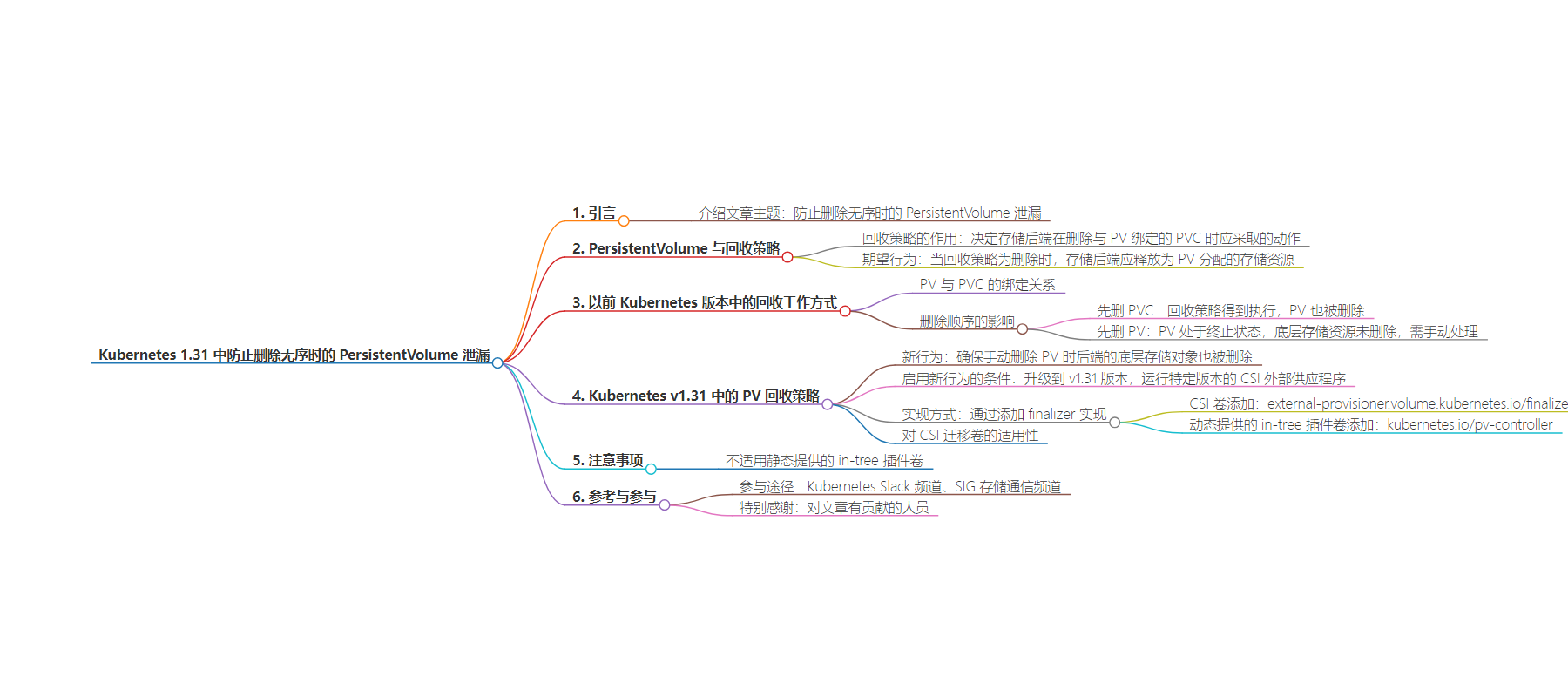包阅导读总结
1.
关键词:Kubernetes 1.31、PersistentVolume、Reclaim Policy、Delete、Storage Backend
2.
总结:本文介绍了 Kubernetes 1.31 中防止删除无序时的 PersistentVolume 泄漏的新特性,包括之前版本的问题、1.31 版本的改进、启用新行为的条件和工作原理,同时提到了一些注意事项和参考信息。
3.
主要内容:
– Kubernetes 1.31 新特性
– 目的:防止删除无序时的 PersistentVolume 泄漏
– 之前的 reclaim 工作方式
– PVC 是用户的存储请求,PV 与 PVC 绑定
– 正常应先删 PVC 再删 PV,先删 PV 会出现问题
– Kubernetes 1.31 中 PV 回收策略
– 确保手动删除 PV 时后端存储对象也被删除
– 需升级到 v1.31 并使用特定版本的 CSI 外部供应器
– 通过添加 finalizer 实现,finalizer 仅在后端存储删除后移除
– 其他情况
– 对 CSI 迁移的卷也适用,但不适用于静态预配的 in-tree 插件卷
– 可通过特定渠道参与相关工作
思维导图:
文章来源:kubernetes.io
作者:Kubernetes Blog
发布时间:2024/8/16 0:00
语言:英文
总字数:845字
预计阅读时间:4分钟
评分:87分
标签:Kubernetes,持久卷,存储管理,回收策略,终结器
以下为原文内容
本内容来源于用户推荐转载,旨在分享知识与观点,如有侵权请联系删除 联系邮箱 media@ilingban.com
Kubernetes 1.31: Prevent PersistentVolume Leaks When Deleting out of Order
By Deepak Kinni (Broadcom) |
PersistentVolume (or PVs for short) areassociated with Reclaim Policy.The reclaim policy is used to determine the actions that need to be taken by the storagebackend on deletion of the PVC Bound to a PV.When the reclaim policy is Delete, the expectation is that the storage backendreleases the storage resource allocated for the PV. In essence, the reclaimpolicy needs to be honored on PV deletion.
With the recent Kubernetes v1.31 release, a beta feature lets you configure yourcluster to behave that way and honor the configured reclaim policy.
How did reclaim work in previous Kubernetes releases?
PersistentVolumeClaim (or PVC for short) isa user’s request for storage. A PV and PVC are considered Boundif a newly created PV or a matching PV is found. The PVs themselves arebacked by volumes allocated by the storage backend.
Normally, if the volume is to be deleted, then the expectation is to delete thePVC for a bound PV-PVC pair. However, there are no restrictions on deleting a PVbefore deleting a PVC.
First, I’ll demonstrate the behavior for clusters running an older version of Kubernetes.
Retrieve a PVC that is bound to a PV
Retrieve an existing PVC example-vanilla-block-pvc
kubectl get pvc example-vanilla-block-pvcThe following output shows the PVC and its bound PV; the PV is shown under the VOLUME column:
NAME STATUS VOLUME CAPACITY ACCESS MODES STORAGECLASS AGEexample-vanilla-block-pvc Bound pvc-6791fdd4-5fad-438e-a7fb-16410363e3da 5Gi RWO example-vanilla-block-sc 19sDelete PV
When I try to delete a bound PV, the kubectl session blocks and the kubectltool does not return back control to the shell; for example:
kubectl delete pv pvc-6791fdd4-5fad-438e-a7fb-16410363e3dapersistentvolume "pvc-6791fdd4-5fad-438e-a7fb-16410363e3da" deleted^CRetrieving the PV
kubectl get pv pvc-6791fdd4-5fad-438e-a7fb-16410363e3daIt can be observed that the PV is in a Terminating state
NAME CAPACITY ACCESS MODES RECLAIM POLICY STATUS CLAIM STORAGECLASS REASON AGEpvc-6791fdd4-5fad-438e-a7fb-16410363e3da 5Gi RWO Delete Terminating default/example-vanilla-block-pvc example-vanilla-block-sc 2m23sDelete PVC
kubectl delete pvc example-vanilla-block-pvcThe following output is seen if the PVC gets successfully deleted:
persistentvolumeclaim "example-vanilla-block-pvc" deletedThe PV object from the cluster also gets deleted. When attempting to retrieve the PVit will be observed that the PV is no longer found:
kubectl get pv pvc-6791fdd4-5fad-438e-a7fb-16410363e3daError from server (NotFound): persistentvolumes "pvc-6791fdd4-5fad-438e-a7fb-16410363e3da" not foundAlthough the PV is deleted, the underlying storage resource is not deleted andneeds to be removed manually.
To sum up, the reclaim policy associated with the PersistentVolume is currentlyignored under certain circumstances. For a Bound PV-PVC pair, the ordering of PV-PVCdeletion determines whether the PV reclaim policy is honored. The reclaim policyis honored if the PVC is deleted first; however, if the PV is deleted prior todeleting the PVC, then the reclaim policy is not exercised. As a result of this behavior,the associated storage asset in the external infrastructure is not removed.
PV reclaim policy with Kubernetes v1.31
The new behavior ensures that the underlying storage object is deleted from the backend when users attempt to delete a PV manually.
How to enable new behavior?
To take advantage of the new behavior, you must have upgraded your cluster to the v1.31 release of Kubernetesand run the CSI external-provisioner version 5.0.1 or later.
How does it work?
For CSI volumes, the new behavior is achieved by adding a finalizer external-provisioner.volume.kubernetes.io/finalizeron new and existing PVs. The finalizer is only removed after the storage from the backend is deleted.`
An example of a PV with the finalizer, notice the new finalizer in the finalizers list
kubectl get pv pvc-a7b7e3ba-f837-45ba-b243-dec7d8aaed53 -o yamlapiVersion: v1kind: PersistentVolumemetadata: annotations: pv.kubernetes.io/provisioned-by: csi.vsphere.vmware.com creationTimestamp: "2021-11-17T19:28:56Z" finalizers: - kubernetes.io/pv-protection - external-provisioner.volume.kubernetes.io/finalizer name: pvc-a7b7e3ba-f837-45ba-b243-dec7d8aaed53 resourceVersion: "194711" uid: 087f14f2-4157-4e95-8a70-8294b039d30espec: accessModes: - ReadWriteOnce capacity: storage: 1Gi claimRef: apiVersion: v1 kind: PersistentVolumeClaim name: example-vanilla-block-pvc namespace: default resourceVersion: "194677" uid: a7b7e3ba-f837-45ba-b243-dec7d8aaed53 csi: driver: csi.vsphere.vmware.com fsType: ext4 volumeAttributes: storage.kubernetes.io/csiProvisionerIdentity: 1637110610497-8081-csi.vsphere.vmware.com type: vSphere CNS Block Volume volumeHandle: 2dacf297-803f-4ccc-afc7-3d3c3f02051e persistentVolumeReclaimPolicy: Delete storageClassName: example-vanilla-block-sc volumeMode: Filesystemstatus: phase: BoundThe finalizer prevents thisPersistentVolume from being removed from thecluster. As stated previously, the finalizer is only removed from the PV objectafter it is successfully deleted from the storage backend. To learn more aboutfinalizers, please refer to Using Finalizers to Control Deletion.
Similarly, the finalizer kubernetes.io/pv-controller is added to dynamically provisioned in-tree plugin volumes.
What about CSI migrated volumes?
The fix applies to CSI migrated volumes as well.
Some caveats
The fix does not apply to statically provisioned in-tree plugin volumes.
References
How do I get involved?
The Kubernetes Slack channel SIG Storage communication channels are great mediums to reach out to the SIG Storage and migration working group teams.
Special thanks to the following people for the insightful reviews, thorough consideration and valuable contribution:
- Fan Baofa (carlory)
- Jan Šafránek (jsafrane)
- Xing Yang (xing-yang)
- Matthew Wong (wongma7)
Join the Kubernetes Storage Special Interest Group (SIG) if you’re interested in getting involved with the design and development of CSI or any part of the Kubernetes Storage system. We’re rapidly growing and always welcome new contributors.
